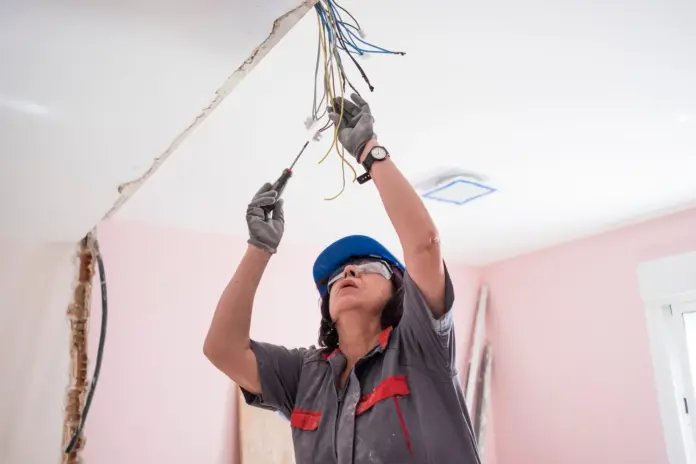How Much Does It Cost to Rewire a House? A Complete Guide – New wiring to accommodate the modernization of a home can be a huge home improvement project that enhances the safety, functionality, and energy efficiency of a home. Whether it’s burnt-out wiring, recurring electrical issues, or your plan to improve your electronics, knowing what to receive is important. In 2025 The cost of rewiring A House in the U.S. Will Depend on Factors Like Your Home Size, Wiring Type, and Labor Rates in Your Area. This guide is going to cover the key aspects of rewiring costs, updated here with the most recent details as of February 2025.
Why Rewire a House?
But before we discuss costs, we need to understand why a rewire might be needed. Here are some common reasons:
Outdated Wiring: Outdated homes that were built before 1980 generally use old wiring like knob-and-tube wiring and aluminum wiring which is quite risky and this hardware is unhealthy when compared to more modern workable wire.
Recurrent Electrical Problems: Frequently tripping circuit breakers, flickering lights or malfunctioning outlets can all be signs of improper wiring.
Home Additions: New rooms — and appliances or new smart home systems — generally involve upgraded electrical systems.
Safety Tip: Faulty wiring causes most house fires. Rewiring can protect against the risk and update your home in line with modern electrical codes.
Also read: Top 10 Most Expensive Real Estate Deals in USA (2024)
House Rewire Costs Average
HomeAdvisor: Rewire house average cost in the U.S. (as of February 2025) $4,000 to $20,00075 percent of homeowners pay $8,000 to $12,000. However, the final price of this service is defined by several factors, which we are going to touch on in the following sections.
| House Size | Average Cost (USD) |
|---|---|
| 1,000 sq. ft. | $4,000 – $6,000 |
| 1,500 sq. ft. | $6,000 – $8,000 |
| 2,000 sq. ft. | $8,000 – $10,000 |
| 3,000 sq. ft. | $12,000 – $15,000 |
| 4,000+ sq. ft. | $15,000 – $20,000 |
Factors That Affect the Rewiring Cost:
Size of the House
The larger your home, the more wire and labor you will need. For example, rewiring a 1,000-square-foot home will cost far less to do than rewiring a 4,000-square-foot home.
Type of Wiring
The cost will also be determined by the wiring you choose. Copper wiring is the most common and most reliable type, but also the most expensive compared to aluminum wiring. Copper is more conductive and durable, so it is preferred.
Labor Costs
Labor costs vary by region and also by the complexity of the job. Electricians typically charge $50 to $100 an hour, and rewiring a house can take a minimum of three days up to 10 days, depending on the size and condition of the house.
Accessibility
If your home has hard-to-clean surfaces, such as crawlspaces or finished walls, then expect the price to be higher. Depending on the reason, electricians might need to cut into walls or ceilings to access the wiring, which can also add to labor and repair costs.
Permits and Inspections
Most states, like Texas, require permits and inspections for rewiring projects. Permit fees often run anywhere from $100 to $500 depending on where you live. Inspectors make sure the work is up to local electrical codes and safety standards.
Additional Upgrades
If you’re rewiring your home, consider upgrading other electrical components, including:
Electrical panel: $1,000 to $3,000 to upgrade to a 200-amp panel.
Outlets and switches: Installing or upgrading outlets and switches, $100 to $200 each.
Lighting: Upgrading light fixtures or adding smart lighting systems can run $500 to $2,000.
How to Save Money on Rewiring
Rewiring a house costs a lot of money, but there are ways to keep costs down:
Get Multiple: Get price estimates from at least three licensed electricians.
Plan Ahead: For renovations, consider adding rewiring to other jobs to make the most of your labor dollars.
Mid-Range Materials: The wiring is best out of copper, but you can afford mid-range on outlets and switches.
Prepare a Little: If you can, clear rooms and move furniture out so the electrician has an easier and faster time.
DIY vs. Hiring a Professional
Whether it is tinting windows, replacing carpet, adding insulation, or having the whole house rewired, some homeowners may be tempted to forgo a professional in favor of a DIY project that can save them 383 dollars, but this can be ill-advised Electrical work can be dangerous, and it often requires specialized training and tools. A licensed electrician will ensure the work is performed safely and up to code. More to the point, home repair that involves electrical systems can nullify home insurance and may not fly with inspectors.
How to Know If You Need to Rewire Your Home
Here are a few warning signs that your home may need to be rewired:
Frequent Circuit Breaker Tripping: Frequent tripping of the circuit breaker may also suggest that the wiring has become overloaded or defective.
Flickering Lights: Flickering or weak lights may indicate an electrical issue.
Burning Smell: Scorch marks around outlets or burning smell is serious warning signs
Old Wiring: Knob-and-tube or aluminum wiring in your home needs to be replaced.
Two-Prong Outlets: Outlets that are of outdated and ungrounded types cannot take modern-day appliances.
Conclusion
Rewiring a house is a daunting task, and it is often necessary for the home to be safe and appropriate for modern living. Between 4k and 20k in 2025 (you need to verify yourself what Maximum you’re going to pay for your House Rewiring based on your location and size of the home, plus wiring type, labor cost, and everything else). Understanding that these details are in place and planning ahead can help you make an informed choice, ensuring that your home’s electrical system is safe and sufficient.
Don’t wait to find out if you think your home needs rewiring. Call a licensed electrician if you have a bad wiring situation and get an estimate from them. If so, get started on a rewiring project today, as it will save you money and prevent a potential hazard with time. You may also want to bundle electrical upgrades with other renovations, which makes sense — not only can it save you time and money as well.








